The Importance of Globalization for Businesses
VerifiedAdded on 2021/04/17
|9
|2903
|342
AI Summary
This assignment discusses the significance of globalization for businesses, emphasizing its potential to increase profitability and brand value. It also examines the role of location and ownership in international business, using Alibaba as a case study. The report concludes that internalization of markets is essential for companies seeking to expand globally.
Contribute Materials
Your contribution can guide someone’s learning journey. Share your
documents today.
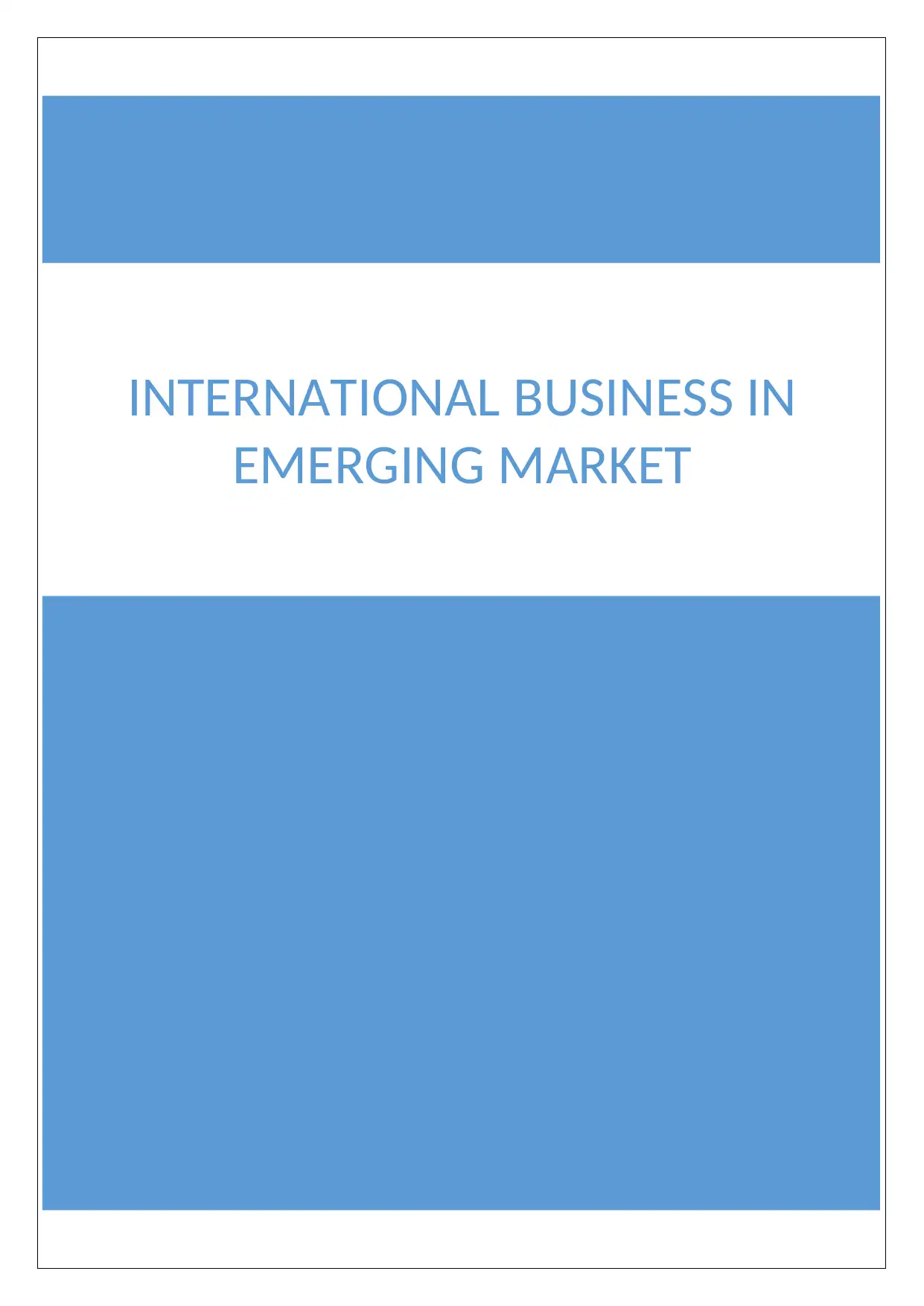
INTERNATIONAL BUSINESS IN
EMERGING MARKET
EMERGING MARKET
Secure Best Marks with AI Grader
Need help grading? Try our AI Grader for instant feedback on your assignments.
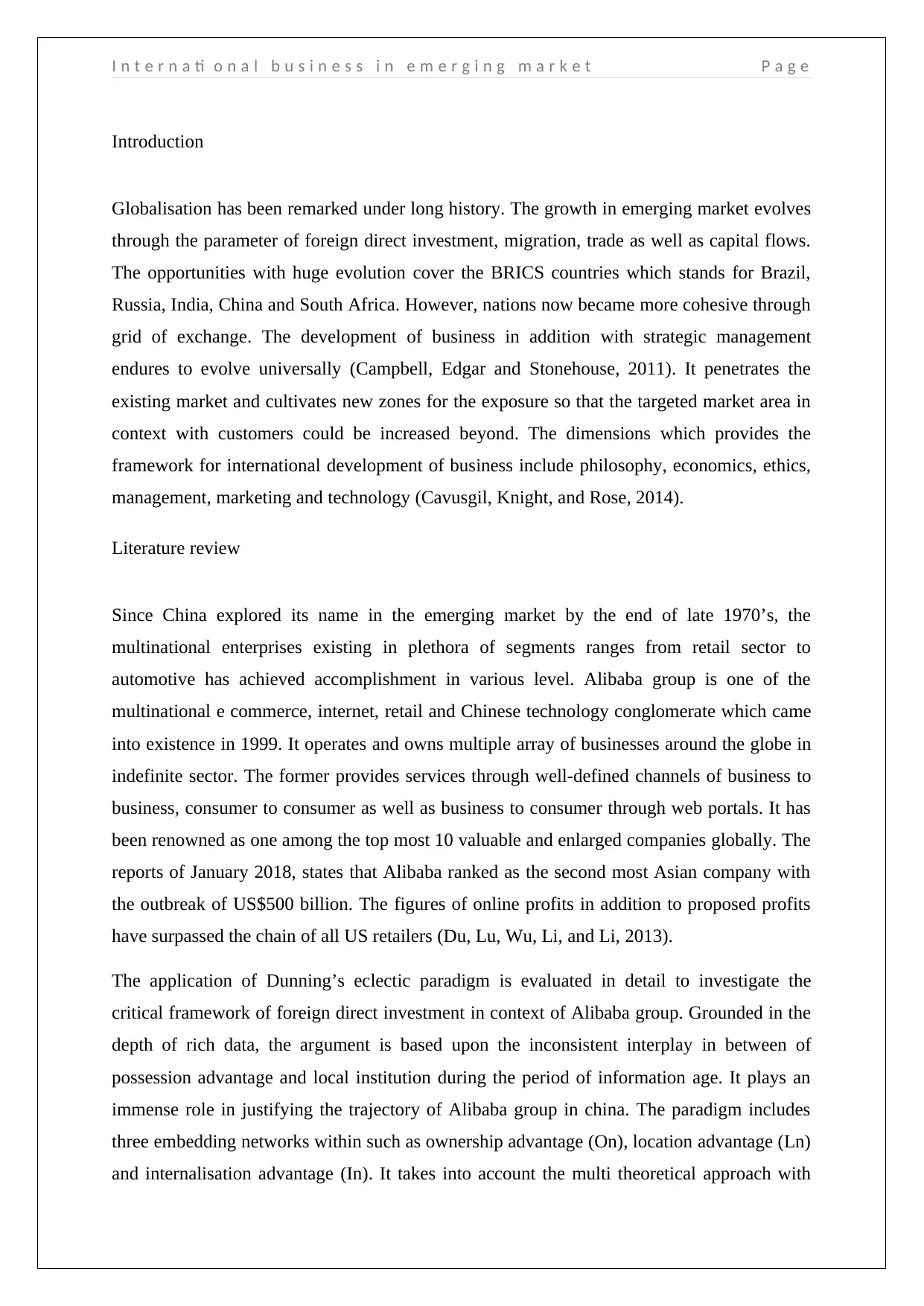
I n t e r n a ti o n a l b u s i n e s s i n e m e r g i n g m a r k e t P a g e
Introduction
Globalisation has been remarked under long history. The growth in emerging market evolves
through the parameter of foreign direct investment, migration, trade as well as capital flows.
The opportunities with huge evolution cover the BRICS countries which stands for Brazil,
Russia, India, China and South Africa. However, nations now became more cohesive through
grid of exchange. The development of business in addition with strategic management
endures to evolve universally (Campbell, Edgar and Stonehouse, 2011). It penetrates the
existing market and cultivates new zones for the exposure so that the targeted market area in
context with customers could be increased beyond. The dimensions which provides the
framework for international development of business include philosophy, economics, ethics,
management, marketing and technology (Cavusgil, Knight, and Rose, 2014).
Literature review
Since China explored its name in the emerging market by the end of late 1970’s, the
multinational enterprises existing in plethora of segments ranges from retail sector to
automotive has achieved accomplishment in various level. Alibaba group is one of the
multinational e commerce, internet, retail and Chinese technology conglomerate which came
into existence in 1999. It operates and owns multiple array of businesses around the globe in
indefinite sector. The former provides services through well-defined channels of business to
business, consumer to consumer as well as business to consumer through web portals. It has
been renowned as one among the top most 10 valuable and enlarged companies globally. The
reports of January 2018, states that Alibaba ranked as the second most Asian company with
the outbreak of US$500 billion. The figures of online profits in addition to proposed profits
have surpassed the chain of all US retailers (Du, Lu, Wu, Li, and Li, 2013).
The application of Dunning’s eclectic paradigm is evaluated in detail to investigate the
critical framework of foreign direct investment in context of Alibaba group. Grounded in the
depth of rich data, the argument is based upon the inconsistent interplay in between of
possession advantage and local institution during the period of information age. It plays an
immense role in justifying the trajectory of Alibaba group in china. The paradigm includes
three embedding networks within such as ownership advantage (On), location advantage (Ln)
and internalisation advantage (In). It takes into account the multi theoretical approach with
Introduction
Globalisation has been remarked under long history. The growth in emerging market evolves
through the parameter of foreign direct investment, migration, trade as well as capital flows.
The opportunities with huge evolution cover the BRICS countries which stands for Brazil,
Russia, India, China and South Africa. However, nations now became more cohesive through
grid of exchange. The development of business in addition with strategic management
endures to evolve universally (Campbell, Edgar and Stonehouse, 2011). It penetrates the
existing market and cultivates new zones for the exposure so that the targeted market area in
context with customers could be increased beyond. The dimensions which provides the
framework for international development of business include philosophy, economics, ethics,
management, marketing and technology (Cavusgil, Knight, and Rose, 2014).
Literature review
Since China explored its name in the emerging market by the end of late 1970’s, the
multinational enterprises existing in plethora of segments ranges from retail sector to
automotive has achieved accomplishment in various level. Alibaba group is one of the
multinational e commerce, internet, retail and Chinese technology conglomerate which came
into existence in 1999. It operates and owns multiple array of businesses around the globe in
indefinite sector. The former provides services through well-defined channels of business to
business, consumer to consumer as well as business to consumer through web portals. It has
been renowned as one among the top most 10 valuable and enlarged companies globally. The
reports of January 2018, states that Alibaba ranked as the second most Asian company with
the outbreak of US$500 billion. The figures of online profits in addition to proposed profits
have surpassed the chain of all US retailers (Du, Lu, Wu, Li, and Li, 2013).
The application of Dunning’s eclectic paradigm is evaluated in detail to investigate the
critical framework of foreign direct investment in context of Alibaba group. Grounded in the
depth of rich data, the argument is based upon the inconsistent interplay in between of
possession advantage and local institution during the period of information age. It plays an
immense role in justifying the trajectory of Alibaba group in china. The paradigm includes
three embedding networks within such as ownership advantage (On), location advantage (Ln)
and internalisation advantage (In). It takes into account the multi theoretical approach with
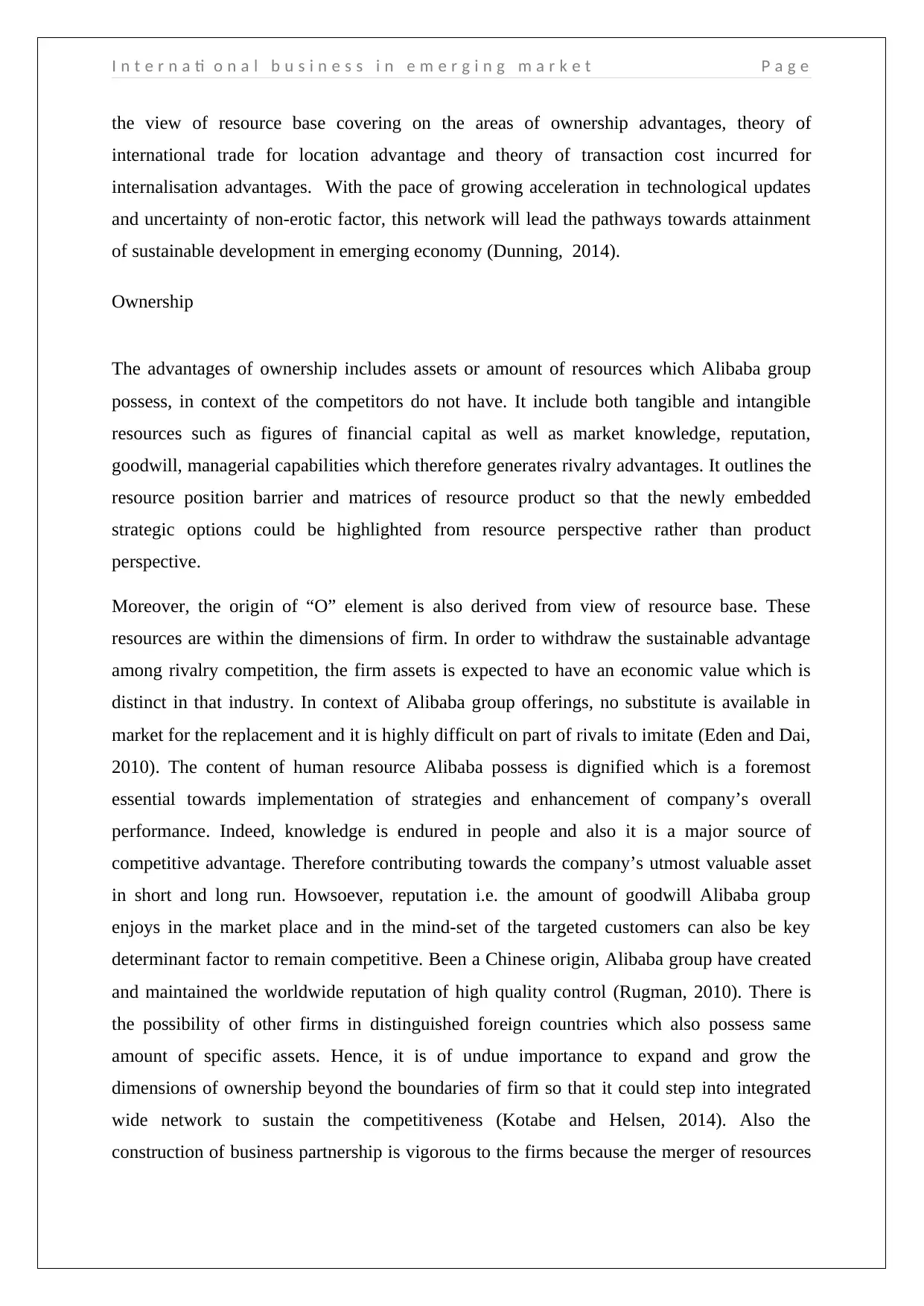
I n t e r n a ti o n a l b u s i n e s s i n e m e r g i n g m a r k e t P a g e
the view of resource base covering on the areas of ownership advantages, theory of
international trade for location advantage and theory of transaction cost incurred for
internalisation advantages. With the pace of growing acceleration in technological updates
and uncertainty of non-erotic factor, this network will lead the pathways towards attainment
of sustainable development in emerging economy (Dunning, 2014).
Ownership
The advantages of ownership includes assets or amount of resources which Alibaba group
possess, in context of the competitors do not have. It include both tangible and intangible
resources such as figures of financial capital as well as market knowledge, reputation,
goodwill, managerial capabilities which therefore generates rivalry advantages. It outlines the
resource position barrier and matrices of resource product so that the newly embedded
strategic options could be highlighted from resource perspective rather than product
perspective.
Moreover, the origin of “O” element is also derived from view of resource base. These
resources are within the dimensions of firm. In order to withdraw the sustainable advantage
among rivalry competition, the firm assets is expected to have an economic value which is
distinct in that industry. In context of Alibaba group offerings, no substitute is available in
market for the replacement and it is highly difficult on part of rivals to imitate (Eden and Dai,
2010). The content of human resource Alibaba possess is dignified which is a foremost
essential towards implementation of strategies and enhancement of company’s overall
performance. Indeed, knowledge is endured in people and also it is a major source of
competitive advantage. Therefore contributing towards the company’s utmost valuable asset
in short and long run. Howsoever, reputation i.e. the amount of goodwill Alibaba group
enjoys in the market place and in the mind-set of the targeted customers can also be key
determinant factor to remain competitive. Been a Chinese origin, Alibaba group have created
and maintained the worldwide reputation of high quality control (Rugman, 2010). There is
the possibility of other firms in distinguished foreign countries which also possess same
amount of specific assets. Hence, it is of undue importance to expand and grow the
dimensions of ownership beyond the boundaries of firm so that it could step into integrated
wide network to sustain the competitiveness (Kotabe and Helsen, 2014). Also the
construction of business partnership is vigorous to the firms because the merger of resources
the view of resource base covering on the areas of ownership advantages, theory of
international trade for location advantage and theory of transaction cost incurred for
internalisation advantages. With the pace of growing acceleration in technological updates
and uncertainty of non-erotic factor, this network will lead the pathways towards attainment
of sustainable development in emerging economy (Dunning, 2014).
Ownership
The advantages of ownership includes assets or amount of resources which Alibaba group
possess, in context of the competitors do not have. It include both tangible and intangible
resources such as figures of financial capital as well as market knowledge, reputation,
goodwill, managerial capabilities which therefore generates rivalry advantages. It outlines the
resource position barrier and matrices of resource product so that the newly embedded
strategic options could be highlighted from resource perspective rather than product
perspective.
Moreover, the origin of “O” element is also derived from view of resource base. These
resources are within the dimensions of firm. In order to withdraw the sustainable advantage
among rivalry competition, the firm assets is expected to have an economic value which is
distinct in that industry. In context of Alibaba group offerings, no substitute is available in
market for the replacement and it is highly difficult on part of rivals to imitate (Eden and Dai,
2010). The content of human resource Alibaba possess is dignified which is a foremost
essential towards implementation of strategies and enhancement of company’s overall
performance. Indeed, knowledge is endured in people and also it is a major source of
competitive advantage. Therefore contributing towards the company’s utmost valuable asset
in short and long run. Howsoever, reputation i.e. the amount of goodwill Alibaba group
enjoys in the market place and in the mind-set of the targeted customers can also be key
determinant factor to remain competitive. Been a Chinese origin, Alibaba group have created
and maintained the worldwide reputation of high quality control (Rugman, 2010). There is
the possibility of other firms in distinguished foreign countries which also possess same
amount of specific assets. Hence, it is of undue importance to expand and grow the
dimensions of ownership beyond the boundaries of firm so that it could step into integrated
wide network to sustain the competitiveness (Kotabe and Helsen, 2014). Also the
construction of business partnership is vigorous to the firms because the merger of resources
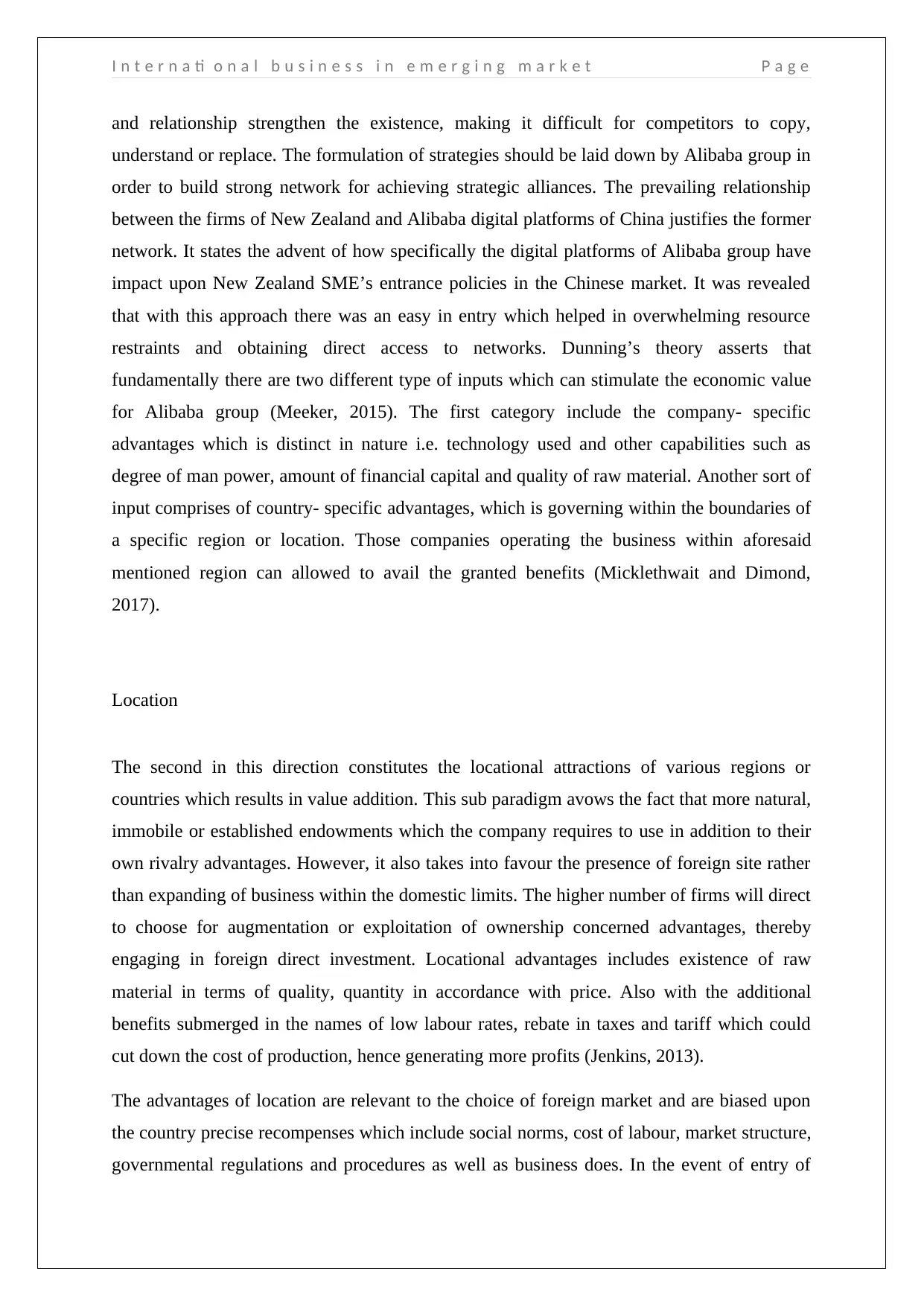
I n t e r n a ti o n a l b u s i n e s s i n e m e r g i n g m a r k e t P a g e
and relationship strengthen the existence, making it difficult for competitors to copy,
understand or replace. The formulation of strategies should be laid down by Alibaba group in
order to build strong network for achieving strategic alliances. The prevailing relationship
between the firms of New Zealand and Alibaba digital platforms of China justifies the former
network. It states the advent of how specifically the digital platforms of Alibaba group have
impact upon New Zealand SME’s entrance policies in the Chinese market. It was revealed
that with this approach there was an easy in entry which helped in overwhelming resource
restraints and obtaining direct access to networks. Dunning’s theory asserts that
fundamentally there are two different type of inputs which can stimulate the economic value
for Alibaba group (Meeker, 2015). The first category include the company- specific
advantages which is distinct in nature i.e. technology used and other capabilities such as
degree of man power, amount of financial capital and quality of raw material. Another sort of
input comprises of country- specific advantages, which is governing within the boundaries of
a specific region or location. Those companies operating the business within aforesaid
mentioned region can allowed to avail the granted benefits (Micklethwait and Dimond,
2017).
Location
The second in this direction constitutes the locational attractions of various regions or
countries which results in value addition. This sub paradigm avows the fact that more natural,
immobile or established endowments which the company requires to use in addition to their
own rivalry advantages. However, it also takes into favour the presence of foreign site rather
than expanding of business within the domestic limits. The higher number of firms will direct
to choose for augmentation or exploitation of ownership concerned advantages, thereby
engaging in foreign direct investment. Locational advantages includes existence of raw
material in terms of quality, quantity in accordance with price. Also with the additional
benefits submerged in the names of low labour rates, rebate in taxes and tariff which could
cut down the cost of production, hence generating more profits (Jenkins, 2013).
The advantages of location are relevant to the choice of foreign market and are biased upon
the country precise recompenses which include social norms, cost of labour, market structure,
governmental regulations and procedures as well as business does. In the event of entry of
and relationship strengthen the existence, making it difficult for competitors to copy,
understand or replace. The formulation of strategies should be laid down by Alibaba group in
order to build strong network for achieving strategic alliances. The prevailing relationship
between the firms of New Zealand and Alibaba digital platforms of China justifies the former
network. It states the advent of how specifically the digital platforms of Alibaba group have
impact upon New Zealand SME’s entrance policies in the Chinese market. It was revealed
that with this approach there was an easy in entry which helped in overwhelming resource
restraints and obtaining direct access to networks. Dunning’s theory asserts that
fundamentally there are two different type of inputs which can stimulate the economic value
for Alibaba group (Meeker, 2015). The first category include the company- specific
advantages which is distinct in nature i.e. technology used and other capabilities such as
degree of man power, amount of financial capital and quality of raw material. Another sort of
input comprises of country- specific advantages, which is governing within the boundaries of
a specific region or location. Those companies operating the business within aforesaid
mentioned region can allowed to avail the granted benefits (Micklethwait and Dimond,
2017).
Location
The second in this direction constitutes the locational attractions of various regions or
countries which results in value addition. This sub paradigm avows the fact that more natural,
immobile or established endowments which the company requires to use in addition to their
own rivalry advantages. However, it also takes into favour the presence of foreign site rather
than expanding of business within the domestic limits. The higher number of firms will direct
to choose for augmentation or exploitation of ownership concerned advantages, thereby
engaging in foreign direct investment. Locational advantages includes existence of raw
material in terms of quality, quantity in accordance with price. Also with the additional
benefits submerged in the names of low labour rates, rebate in taxes and tariff which could
cut down the cost of production, hence generating more profits (Jenkins, 2013).
The advantages of location are relevant to the choice of foreign market and are biased upon
the country precise recompenses which include social norms, cost of labour, market structure,
governmental regulations and procedures as well as business does. In the event of entry of
Secure Best Marks with AI Grader
Need help grading? Try our AI Grader for instant feedback on your assignments.
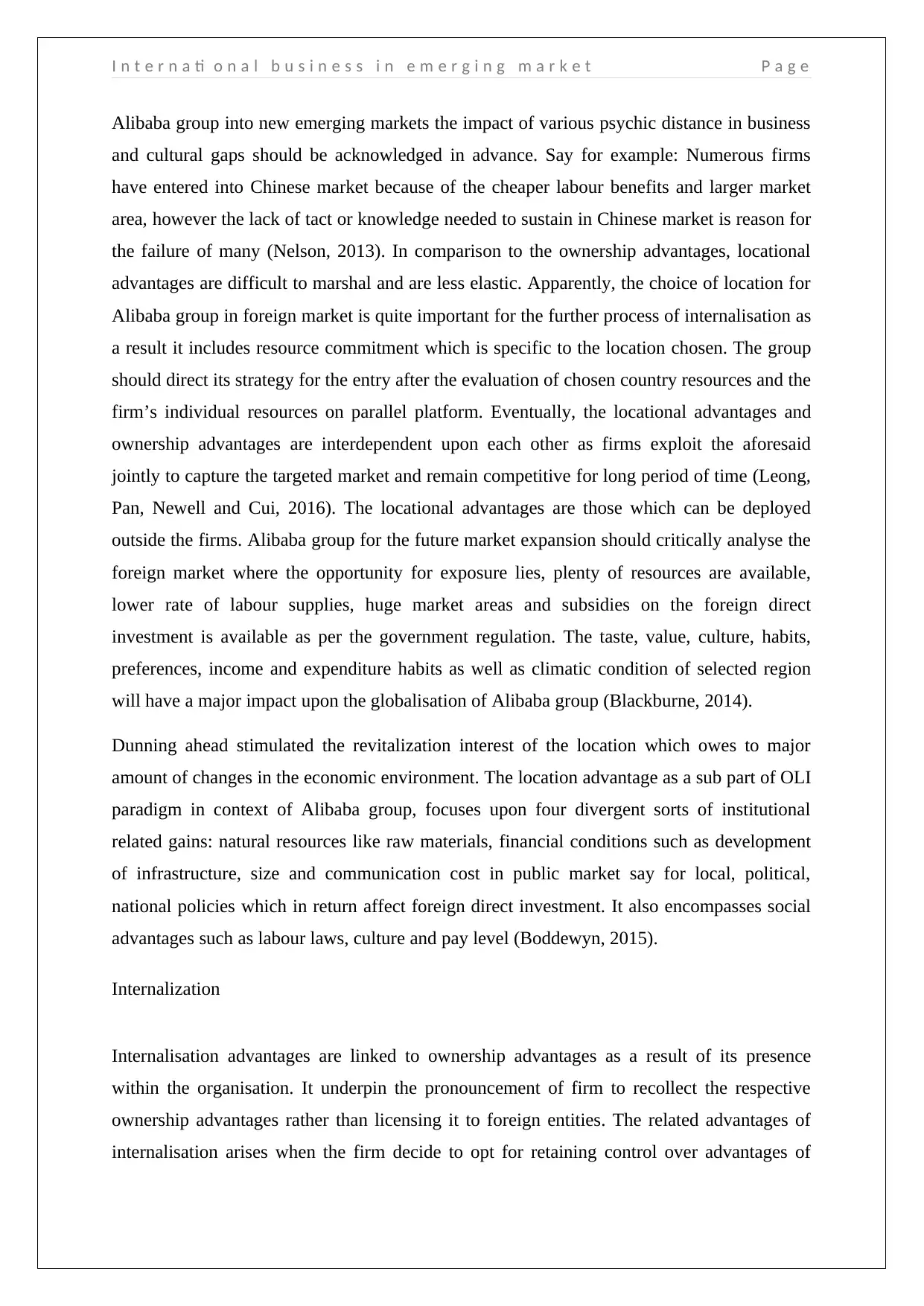
I n t e r n a ti o n a l b u s i n e s s i n e m e r g i n g m a r k e t P a g e
Alibaba group into new emerging markets the impact of various psychic distance in business
and cultural gaps should be acknowledged in advance. Say for example: Numerous firms
have entered into Chinese market because of the cheaper labour benefits and larger market
area, however the lack of tact or knowledge needed to sustain in Chinese market is reason for
the failure of many (Nelson, 2013). In comparison to the ownership advantages, locational
advantages are difficult to marshal and are less elastic. Apparently, the choice of location for
Alibaba group in foreign market is quite important for the further process of internalisation as
a result it includes resource commitment which is specific to the location chosen. The group
should direct its strategy for the entry after the evaluation of chosen country resources and the
firm’s individual resources on parallel platform. Eventually, the locational advantages and
ownership advantages are interdependent upon each other as firms exploit the aforesaid
jointly to capture the targeted market and remain competitive for long period of time (Leong,
Pan, Newell and Cui, 2016). The locational advantages are those which can be deployed
outside the firms. Alibaba group for the future market expansion should critically analyse the
foreign market where the opportunity for exposure lies, plenty of resources are available,
lower rate of labour supplies, huge market areas and subsidies on the foreign direct
investment is available as per the government regulation. The taste, value, culture, habits,
preferences, income and expenditure habits as well as climatic condition of selected region
will have a major impact upon the globalisation of Alibaba group (Blackburne, 2014).
Dunning ahead stimulated the revitalization interest of the location which owes to major
amount of changes in the economic environment. The location advantage as a sub part of OLI
paradigm in context of Alibaba group, focuses upon four divergent sorts of institutional
related gains: natural resources like raw materials, financial conditions such as development
of infrastructure, size and communication cost in public market say for local, political,
national policies which in return affect foreign direct investment. It also encompasses social
advantages such as labour laws, culture and pay level (Boddewyn, 2015).
Internalization
Internalisation advantages are linked to ownership advantages as a result of its presence
within the organisation. It underpin the pronouncement of firm to recollect the respective
ownership advantages rather than licensing it to foreign entities. The related advantages of
internalisation arises when the firm decide to opt for retaining control over advantages of
Alibaba group into new emerging markets the impact of various psychic distance in business
and cultural gaps should be acknowledged in advance. Say for example: Numerous firms
have entered into Chinese market because of the cheaper labour benefits and larger market
area, however the lack of tact or knowledge needed to sustain in Chinese market is reason for
the failure of many (Nelson, 2013). In comparison to the ownership advantages, locational
advantages are difficult to marshal and are less elastic. Apparently, the choice of location for
Alibaba group in foreign market is quite important for the further process of internalisation as
a result it includes resource commitment which is specific to the location chosen. The group
should direct its strategy for the entry after the evaluation of chosen country resources and the
firm’s individual resources on parallel platform. Eventually, the locational advantages and
ownership advantages are interdependent upon each other as firms exploit the aforesaid
jointly to capture the targeted market and remain competitive for long period of time (Leong,
Pan, Newell and Cui, 2016). The locational advantages are those which can be deployed
outside the firms. Alibaba group for the future market expansion should critically analyse the
foreign market where the opportunity for exposure lies, plenty of resources are available,
lower rate of labour supplies, huge market areas and subsidies on the foreign direct
investment is available as per the government regulation. The taste, value, culture, habits,
preferences, income and expenditure habits as well as climatic condition of selected region
will have a major impact upon the globalisation of Alibaba group (Blackburne, 2014).
Dunning ahead stimulated the revitalization interest of the location which owes to major
amount of changes in the economic environment. The location advantage as a sub part of OLI
paradigm in context of Alibaba group, focuses upon four divergent sorts of institutional
related gains: natural resources like raw materials, financial conditions such as development
of infrastructure, size and communication cost in public market say for local, political,
national policies which in return affect foreign direct investment. It also encompasses social
advantages such as labour laws, culture and pay level (Boddewyn, 2015).
Internalization
Internalisation advantages are linked to ownership advantages as a result of its presence
within the organisation. It underpin the pronouncement of firm to recollect the respective
ownership advantages rather than licensing it to foreign entities. The related advantages of
internalisation arises when the firm decide to opt for retaining control over advantages of
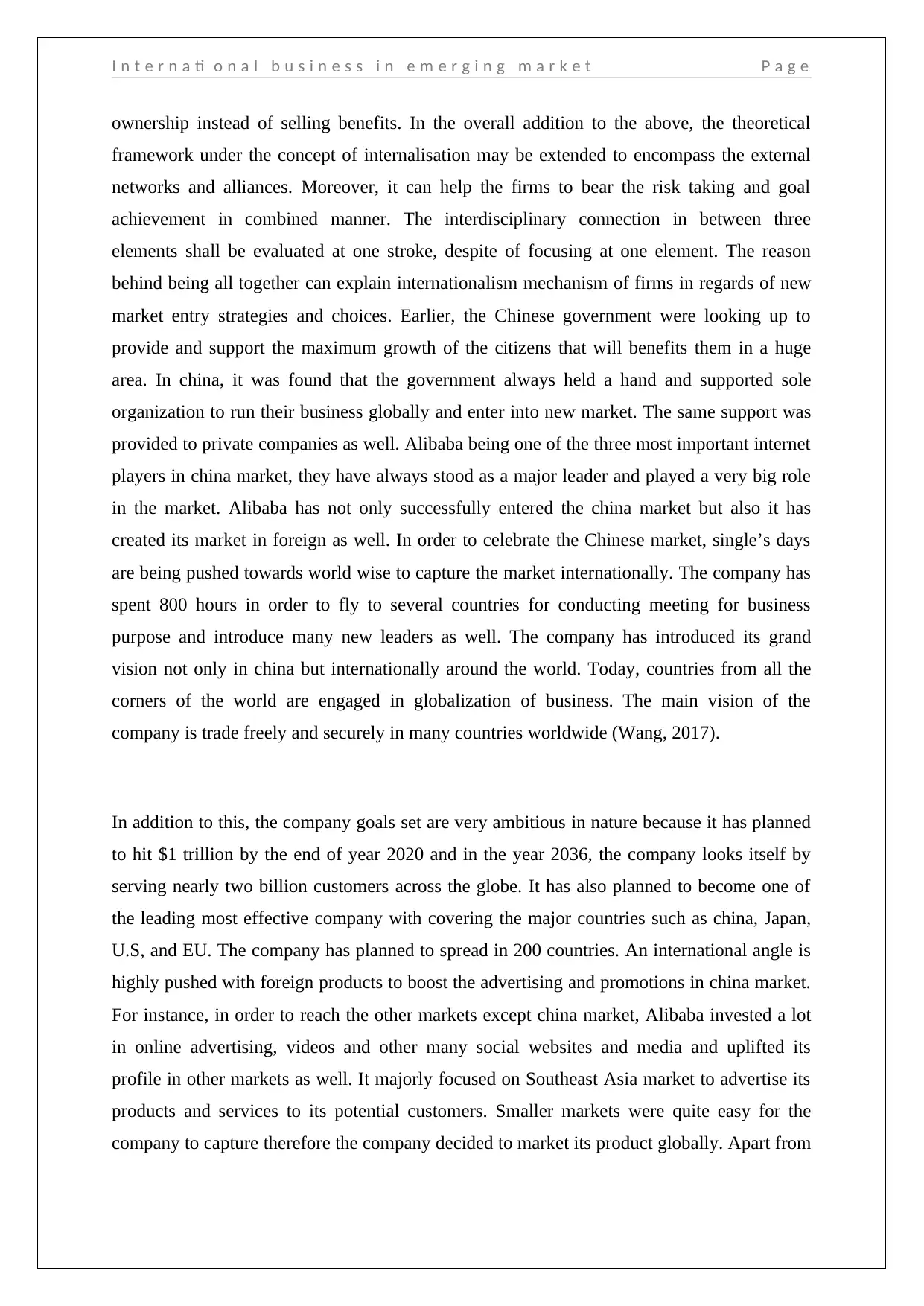
I n t e r n a ti o n a l b u s i n e s s i n e m e r g i n g m a r k e t P a g e
ownership instead of selling benefits. In the overall addition to the above, the theoretical
framework under the concept of internalisation may be extended to encompass the external
networks and alliances. Moreover, it can help the firms to bear the risk taking and goal
achievement in combined manner. The interdisciplinary connection in between three
elements shall be evaluated at one stroke, despite of focusing at one element. The reason
behind being all together can explain internationalism mechanism of firms in regards of new
market entry strategies and choices. Earlier, the Chinese government were looking up to
provide and support the maximum growth of the citizens that will benefits them in a huge
area. In china, it was found that the government always held a hand and supported sole
organization to run their business globally and enter into new market. The same support was
provided to private companies as well. Alibaba being one of the three most important internet
players in china market, they have always stood as a major leader and played a very big role
in the market. Alibaba has not only successfully entered the china market but also it has
created its market in foreign as well. In order to celebrate the Chinese market, single’s days
are being pushed towards world wise to capture the market internationally. The company has
spent 800 hours in order to fly to several countries for conducting meeting for business
purpose and introduce many new leaders as well. The company has introduced its grand
vision not only in china but internationally around the world. Today, countries from all the
corners of the world are engaged in globalization of business. The main vision of the
company is trade freely and securely in many countries worldwide (Wang, 2017).
In addition to this, the company goals set are very ambitious in nature because it has planned
to hit $1 trillion by the end of year 2020 and in the year 2036, the company looks itself by
serving nearly two billion customers across the globe. It has also planned to become one of
the leading most effective company with covering the major countries such as china, Japan,
U.S, and EU. The company has planned to spread in 200 countries. An international angle is
highly pushed with foreign products to boost the advertising and promotions in china market.
For instance, in order to reach the other markets except china market, Alibaba invested a lot
in online advertising, videos and other many social websites and media and uplifted its
profile in other markets as well. It majorly focused on Southeast Asia market to advertise its
products and services to its potential customers. Smaller markets were quite easy for the
company to capture therefore the company decided to market its product globally. Apart from
ownership instead of selling benefits. In the overall addition to the above, the theoretical
framework under the concept of internalisation may be extended to encompass the external
networks and alliances. Moreover, it can help the firms to bear the risk taking and goal
achievement in combined manner. The interdisciplinary connection in between three
elements shall be evaluated at one stroke, despite of focusing at one element. The reason
behind being all together can explain internationalism mechanism of firms in regards of new
market entry strategies and choices. Earlier, the Chinese government were looking up to
provide and support the maximum growth of the citizens that will benefits them in a huge
area. In china, it was found that the government always held a hand and supported sole
organization to run their business globally and enter into new market. The same support was
provided to private companies as well. Alibaba being one of the three most important internet
players in china market, they have always stood as a major leader and played a very big role
in the market. Alibaba has not only successfully entered the china market but also it has
created its market in foreign as well. In order to celebrate the Chinese market, single’s days
are being pushed towards world wise to capture the market internationally. The company has
spent 800 hours in order to fly to several countries for conducting meeting for business
purpose and introduce many new leaders as well. The company has introduced its grand
vision not only in china but internationally around the world. Today, countries from all the
corners of the world are engaged in globalization of business. The main vision of the
company is trade freely and securely in many countries worldwide (Wang, 2017).
In addition to this, the company goals set are very ambitious in nature because it has planned
to hit $1 trillion by the end of year 2020 and in the year 2036, the company looks itself by
serving nearly two billion customers across the globe. It has also planned to become one of
the leading most effective company with covering the major countries such as china, Japan,
U.S, and EU. The company has planned to spread in 200 countries. An international angle is
highly pushed with foreign products to boost the advertising and promotions in china market.
For instance, in order to reach the other markets except china market, Alibaba invested a lot
in online advertising, videos and other many social websites and media and uplifted its
profile in other markets as well. It majorly focused on Southeast Asia market to advertise its
products and services to its potential customers. Smaller markets were quite easy for the
company to capture therefore the company decided to market its product globally. Apart from
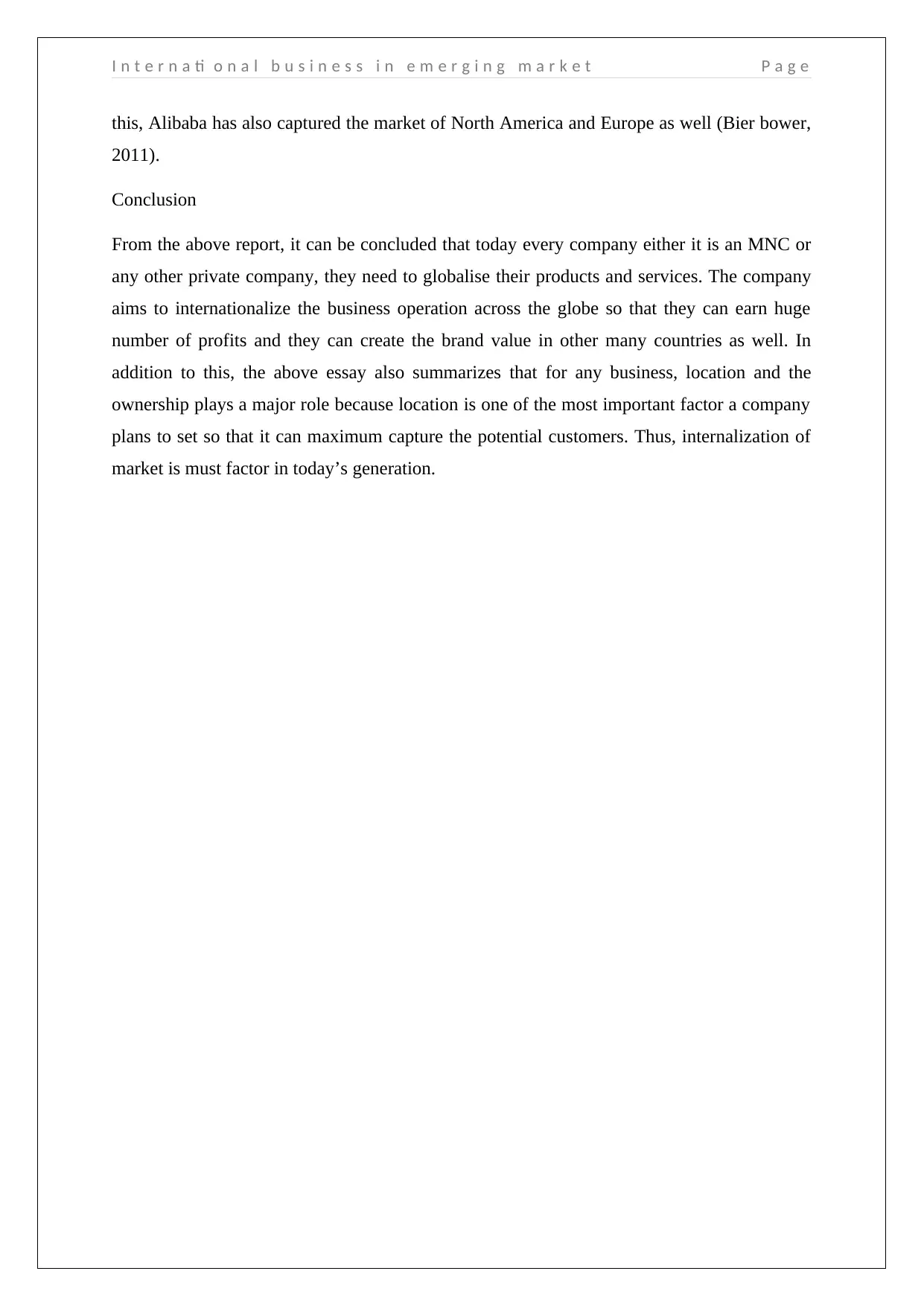
I n t e r n a ti o n a l b u s i n e s s i n e m e r g i n g m a r k e t P a g e
this, Alibaba has also captured the market of North America and Europe as well (Bier bower,
2011).
Conclusion
From the above report, it can be concluded that today every company either it is an MNC or
any other private company, they need to globalise their products and services. The company
aims to internationalize the business operation across the globe so that they can earn huge
number of profits and they can create the brand value in other many countries as well. In
addition to this, the above essay also summarizes that for any business, location and the
ownership plays a major role because location is one of the most important factor a company
plans to set so that it can maximum capture the potential customers. Thus, internalization of
market is must factor in today’s generation.
this, Alibaba has also captured the market of North America and Europe as well (Bier bower,
2011).
Conclusion
From the above report, it can be concluded that today every company either it is an MNC or
any other private company, they need to globalise their products and services. The company
aims to internationalize the business operation across the globe so that they can earn huge
number of profits and they can create the brand value in other many countries as well. In
addition to this, the above essay also summarizes that for any business, location and the
ownership plays a major role because location is one of the most important factor a company
plans to set so that it can maximum capture the potential customers. Thus, internalization of
market is must factor in today’s generation.
Paraphrase This Document
Need a fresh take? Get an instant paraphrase of this document with our AI Paraphraser
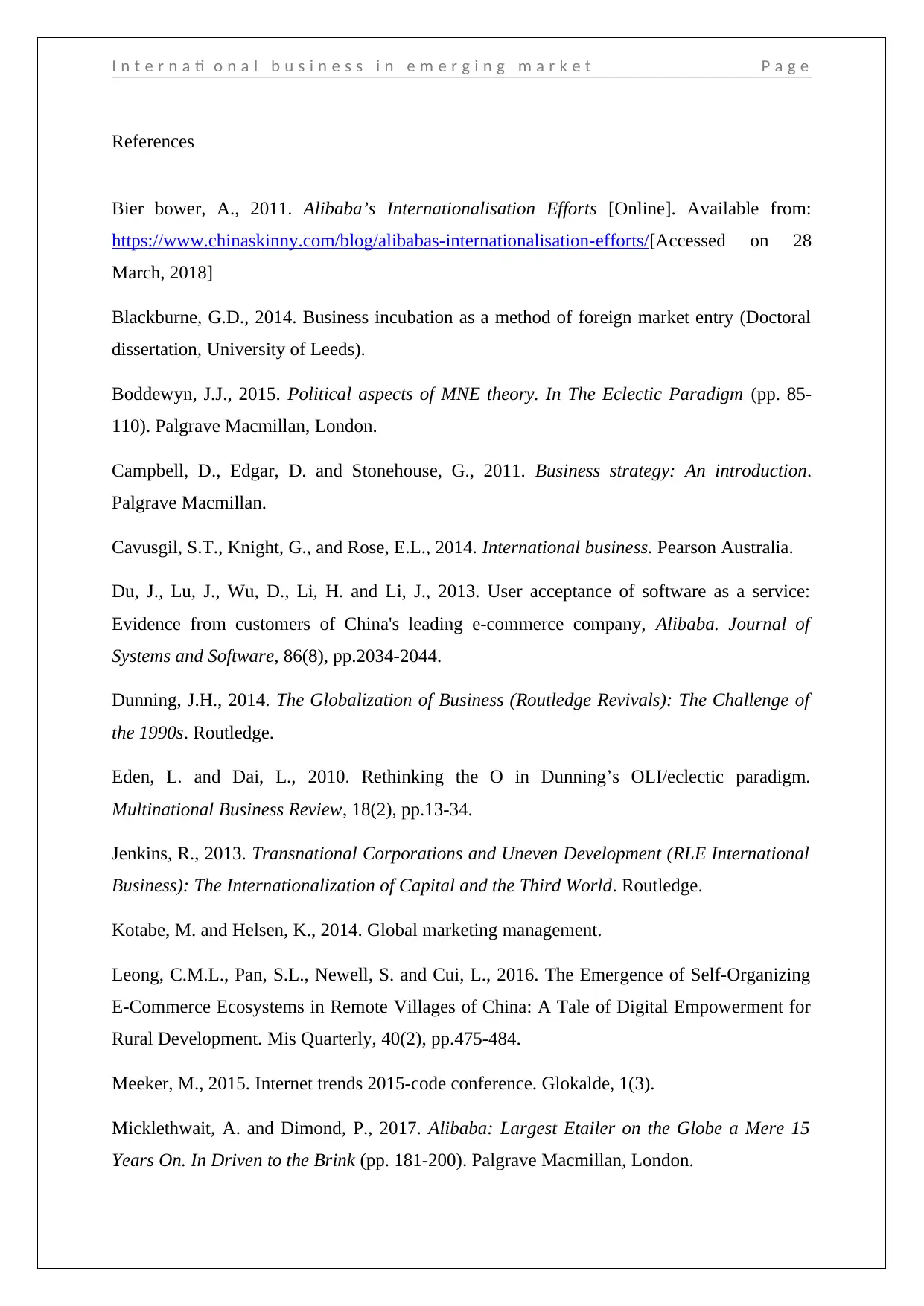
I n t e r n a ti o n a l b u s i n e s s i n e m e r g i n g m a r k e t P a g e
References
Bier bower, A., 2011. Alibaba’s Internationalisation Efforts [Online]. Available from:
https://www.chinaskinny.com/blog/alibabas-internationalisation-efforts/[Accessed on 28
March, 2018]
Blackburne, G.D., 2014. Business incubation as a method of foreign market entry (Doctoral
dissertation, University of Leeds).
Boddewyn, J.J., 2015. Political aspects of MNE theory. In The Eclectic Paradigm (pp. 85-
110). Palgrave Macmillan, London.
Campbell, D., Edgar, D. and Stonehouse, G., 2011. Business strategy: An introduction.
Palgrave Macmillan.
Cavusgil, S.T., Knight, G., and Rose, E.L., 2014. International business. Pearson Australia.
Du, J., Lu, J., Wu, D., Li, H. and Li, J., 2013. User acceptance of software as a service:
Evidence from customers of China's leading e-commerce company, Alibaba. Journal of
Systems and Software, 86(8), pp.2034-2044.
Dunning, J.H., 2014. The Globalization of Business (Routledge Revivals): The Challenge of
the 1990s. Routledge.
Eden, L. and Dai, L., 2010. Rethinking the O in Dunning’s OLI/eclectic paradigm.
Multinational Business Review, 18(2), pp.13-34.
Jenkins, R., 2013. Transnational Corporations and Uneven Development (RLE International
Business): The Internationalization of Capital and the Third World. Routledge.
Kotabe, M. and Helsen, K., 2014. Global marketing management.
Leong, C.M.L., Pan, S.L., Newell, S. and Cui, L., 2016. The Emergence of Self-Organizing
E-Commerce Ecosystems in Remote Villages of China: A Tale of Digital Empowerment for
Rural Development. Mis Quarterly, 40(2), pp.475-484.
Meeker, M., 2015. Internet trends 2015-code conference. Glokalde, 1(3).
Micklethwait, A. and Dimond, P., 2017. Alibaba: Largest Etailer on the Globe a Mere 15
Years On. In Driven to the Brink (pp. 181-200). Palgrave Macmillan, London.
References
Bier bower, A., 2011. Alibaba’s Internationalisation Efforts [Online]. Available from:
https://www.chinaskinny.com/blog/alibabas-internationalisation-efforts/[Accessed on 28
March, 2018]
Blackburne, G.D., 2014. Business incubation as a method of foreign market entry (Doctoral
dissertation, University of Leeds).
Boddewyn, J.J., 2015. Political aspects of MNE theory. In The Eclectic Paradigm (pp. 85-
110). Palgrave Macmillan, London.
Campbell, D., Edgar, D. and Stonehouse, G., 2011. Business strategy: An introduction.
Palgrave Macmillan.
Cavusgil, S.T., Knight, G., and Rose, E.L., 2014. International business. Pearson Australia.
Du, J., Lu, J., Wu, D., Li, H. and Li, J., 2013. User acceptance of software as a service:
Evidence from customers of China's leading e-commerce company, Alibaba. Journal of
Systems and Software, 86(8), pp.2034-2044.
Dunning, J.H., 2014. The Globalization of Business (Routledge Revivals): The Challenge of
the 1990s. Routledge.
Eden, L. and Dai, L., 2010. Rethinking the O in Dunning’s OLI/eclectic paradigm.
Multinational Business Review, 18(2), pp.13-34.
Jenkins, R., 2013. Transnational Corporations and Uneven Development (RLE International
Business): The Internationalization of Capital and the Third World. Routledge.
Kotabe, M. and Helsen, K., 2014. Global marketing management.
Leong, C.M.L., Pan, S.L., Newell, S. and Cui, L., 2016. The Emergence of Self-Organizing
E-Commerce Ecosystems in Remote Villages of China: A Tale of Digital Empowerment for
Rural Development. Mis Quarterly, 40(2), pp.475-484.
Meeker, M., 2015. Internet trends 2015-code conference. Glokalde, 1(3).
Micklethwait, A. and Dimond, P., 2017. Alibaba: Largest Etailer on the Globe a Mere 15
Years On. In Driven to the Brink (pp. 181-200). Palgrave Macmillan, London.
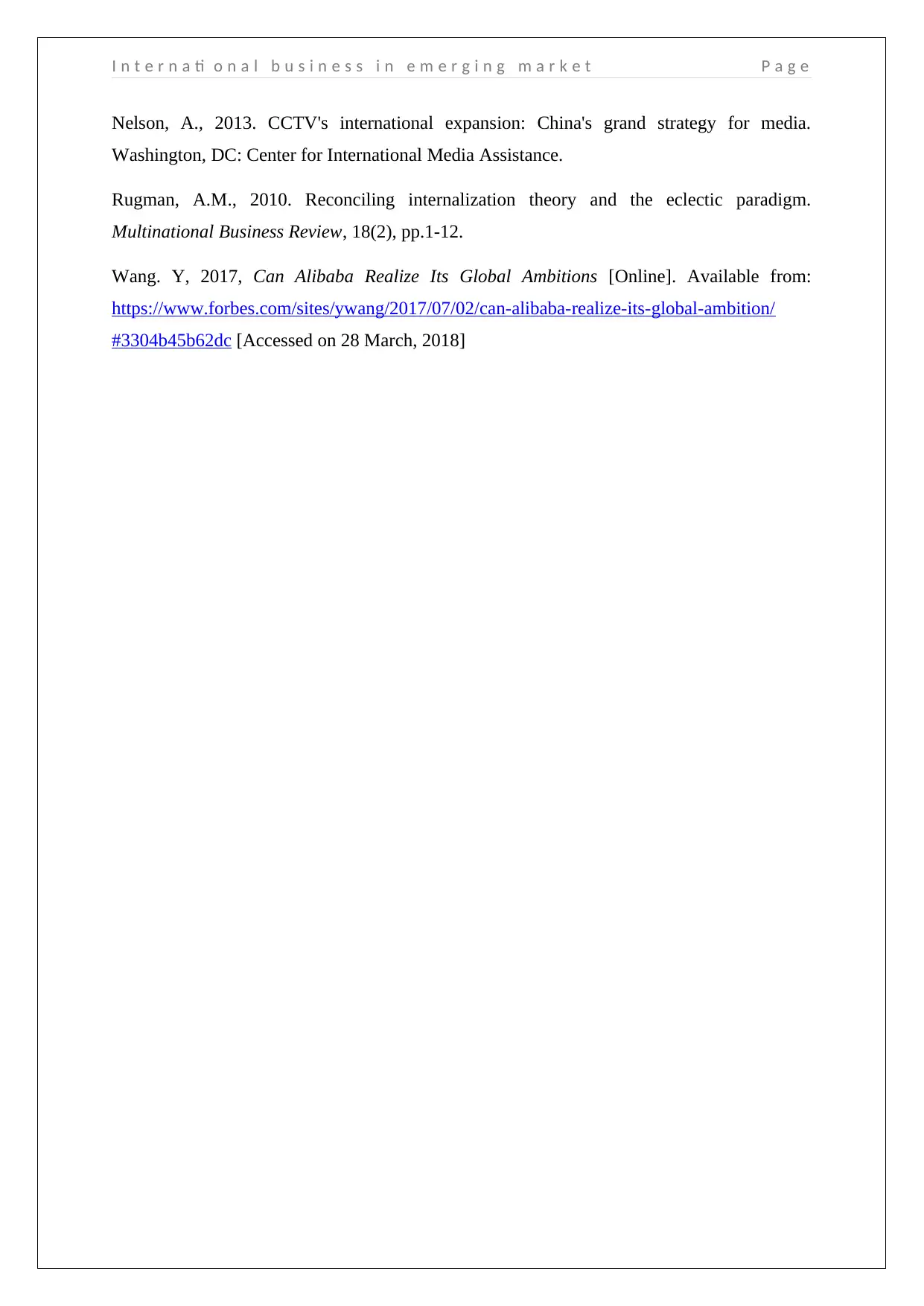
I n t e r n a ti o n a l b u s i n e s s i n e m e r g i n g m a r k e t P a g e
Nelson, A., 2013. CCTV's international expansion: China's grand strategy for media.
Washington, DC: Center for International Media Assistance.
Rugman, A.M., 2010. Reconciling internalization theory and the eclectic paradigm.
Multinational Business Review, 18(2), pp.1-12.
Wang. Y, 2017, Can Alibaba Realize Its Global Ambitions [Online]. Available from:
https://www.forbes.com/sites/ywang/2017/07/02/can-alibaba-realize-its-global-ambition/
#3304b45b62dc [Accessed on 28 March, 2018]
Nelson, A., 2013. CCTV's international expansion: China's grand strategy for media.
Washington, DC: Center for International Media Assistance.
Rugman, A.M., 2010. Reconciling internalization theory and the eclectic paradigm.
Multinational Business Review, 18(2), pp.1-12.
Wang. Y, 2017, Can Alibaba Realize Its Global Ambitions [Online]. Available from:
https://www.forbes.com/sites/ywang/2017/07/02/can-alibaba-realize-its-global-ambition/
#3304b45b62dc [Accessed on 28 March, 2018]
1 out of 9
Related Documents
Your All-in-One AI-Powered Toolkit for Academic Success.
+13062052269
info@desklib.com
Available 24*7 on WhatsApp / Email
![[object Object]](/_next/static/media/star-bottom.7253800d.svg)
Unlock your academic potential
© 2024 | Zucol Services PVT LTD | All rights reserved.





